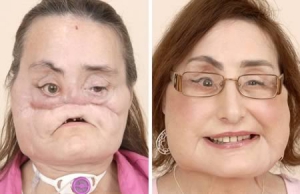Patients with severe burns to their face have been treated with skin transplants in order to help them cope with common body functions which the average person takes for granted, like opening and closing of eyelids or breathing. Patients have to undergo numerous skin grafts, where skin is transplanted from other body areas. The process can take years, as multiple surgeries are needed. Facial skin is also more tender and pliable, making it different from the type of skin in other areas of the body, and plastic surgeons are working to make the facial appearance of the patient less mask-like. The journey to recovery becomes a long and difficult one, which can be likened to an emotional roller coaster: there is surgery and the time to heal, after which more surgery is required.
The possibility of a face transplant sounded like a futuristic item till a short time ago, but French doctors have used new techniques to restore the facial features of a 38-year-old woman, whose face had been mauled by a dog. The partial transplant was done using the mouth, nose and chin of a brain dead donor.
Maria Siemionow, the director of plastic-surgery research at the Cleveland Clinic states, that facial transplant can only be considered as a treatment for severely disfigured patients who have exhausted all conventional options. The procedure itself remains controversial and risky. It involves harvesting the face from a brain-dead organ donor in a 4 to 6 hour surgery. In the following 10 to 15 hour procedure the face is draped over the bones and muscles of the recipient. Following surgery the transplant patients needs to take medication to prevent the rejection of the transplant. Even though the risk is not any different than the risk, which goes along with a kidney transplant, there is the possibility of transplant rejection and of side effects from immunosuppressants. Patients, who take this medication that will cost about $2000 per month, are more susceptible to infection, cancer, metabolic disorders, and liver and kidney damage. The psychological impact on the patient will also be significant, as there could be a feeling of having a different identity. Dr. James Zins, chairman for plastic surgery at the Cleveland Clinic, insists that there are no races to be won and the approach to this new option should be methodical and slow.
Not all potential candidates for the surgery are willing to take the risk of life-long immuno-suppressants and it is only a consideration for physical as well as psychologically suitable patients who are willing to take the risk of receiving a new face after devastating accidents.
Reference: December 12, 2005 issue of Newsweek, pages 60-61
Last edited December 6, 2012






